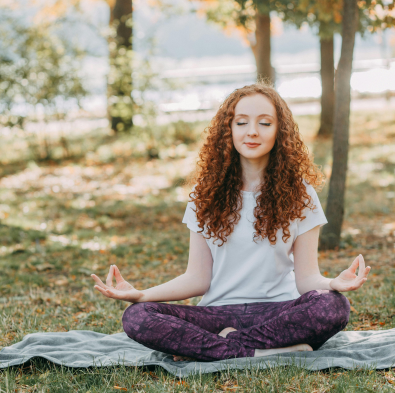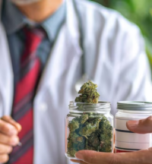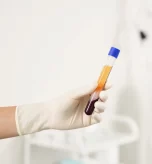Coping with Anxiety and Depression During Thanksgiving
Thanksgiving is meant to be a time of gratitude, family gatherings, and delicious food. But for many, it’s also a time of stress, anxiety, and even depression. The pressure to create the “perfect holiday,” combined with travel stress, financial concerns, and complicated family dynamics, can take a toll on mental health.
As a physician, I often see a spike in patients struggling with heightened anxiety and depressive symptoms during the holiday season. The expectations—whether self-imposed or from others—can feel overwhelming. If you already deal with anxiety or depression, these stressors can amplify symptoms, making the holidays feel more like a challenge than a celebration.
The good news? You’re not alone, and there are effective ways to manage holiday-related anxiety and depression. In this guide, we’ll explore how medical marijuana and other complementary techniques can help you maintain balance and emotional well-being during this busy season.

Understanding the Holiday Mental Health Paradox
Holidays are supposed to bring joy and connection, yet for many people, they trigger stress, anxiety, and depression. This contrast—between the expected happiness and the reality of emotional struggle—is what I call the holiday mental health paradox.
Several factors contribute to this paradox:
- Increased Social Pressure – Large family gatherings or social events can feel overwhelming, especially if there are unresolved conflicts or strained relationships.
- High Expectations – The pressure to create the “perfect holiday” with flawless meals, ideal gifts, and memorable moments can lead to burnout and disappointment.
- Travel Stress – Long flights, crowded airports, traffic jams, and unexpected delays add frustration and anxiety to an already busy season.
- Financial Strain – Holiday shopping, travel expenses, and event planning can create financial stress, increasing feelings of worry and guilt.
- Seasonal Affective Disorder (SAD) – Shorter days and less sunlight during late fall and winter can lead to seasonal depression, further intensifying emotional struggles.
Understanding these triggers is the first step toward managing your mental health during the holidays. Acknowledging your feelings and knowing you’re not alone can help reduce the guilt or pressure you may be placing on yourself.
The Role of Medical Marijuana in Managing Anxiety and Depression
For individuals struggling with anxiety and depression, medical marijuana has emerged as a promising option for relief. Unlike traditional medications, which can take weeks to show results, certain cannabis compounds may provide faster symptom relief with fewer side effects for some patients.
The two most well-known compounds in cannabis—CBD (cannabidiol) and THC (tetrahydrocannabinol)—play different roles in mental health management:
- CBD is a non-psychoactive compound known for its calming and anti-anxiety effects. It interacts with serotonin receptors in the brain, helping to regulate mood and reduce stress without causing a “high.”
- THC is the psychoactive component of cannabis. In low doses, it can promote relaxation and euphoria, but higher doses may increase anxiety in some individuals.
When used under medical supervision, medical marijuana can help regulate mood, ease anxious thoughts, and improve overall emotional balance. Many patients report that cannabis helps them feel more present and in control during stressful situations—something especially valuable during the holidays.
However, it’s important to find the right strain, dosage, and method of use for your individual needs. Consulting with a physician can help ensure that you’re using medical marijuana safely and effectively to manage holiday stress and anxiety.
Five Ways Medical Marijuana Can Alleviate Holiday Stress
Medical marijuana can be an effective tool for managing anxiety and depression during the holiday season. When used responsibly and under medical supervision, it can help reduce stress, improve mood, and promote relaxation. Here are five ways it can help:
- Regulates Mood Through Serotonin Receptors
- CBD interacts with serotonin receptors, which play a key role in mood regulation.
- Stabilizing serotonin levels may help reduce symptoms of anxiety and depression.
- Promotes Relaxation Without Impairment
- Unlike THC, CBD provides calmness without a psychoactive effect.
- Ideal for those who want relief from stress and social anxiety while staying clear-headed.
- Reduces Physical Symptoms of Anxiety
- Anxiety can cause increased heart rate, shallow breathing, and muscle tension.
- CBD-dominant strains have been shown to lower heart rate and promote relaxation.
- Offers Anti-Inflammatory Benefits
- Chronic stress and anxiety contribute to inflammation, worsening symptoms of depression.
- Cannabis has natural anti-inflammatory properties, helping to reduce physical tension and fatigue.
- Supports Brain Health and Emotional Resilience
- CBD promotes neurogenesis—the growth of new neurons in the hippocampus, which helps regulate emotions.
- This process may help counteract the long-term effects of stress and anxiety.
By choosing the right strain, dosage, and method of consumption, medical marijuana can be a valuable tool for mental wellness during high-stress times like Thanksgiving. Combining it with other wellness techniques can enhance its benefits even further
Complementary Practices to Enhance Well-Being
While medical marijuana can be helpful in managing anxiety and depression, it works best when combined with healthy lifestyle practices. Adding these complementary techniques can further improve your emotional well-being and help you stay grounded during the holiday season.
1. Practice Mindful Breathing
Deep breathing exercises help activate the body’s relaxation response, reducing stress and anxiety. Try the 4-7-8 breathing technique:
- Inhale deeply through your nose for 4 seconds.
- Hold your breath for 7 seconds.
- Exhale slowly through your mouth for 8 seconds.
Repeating this a few times can quickly calm your nervous system and reduce tension.
2. Set Realistic Expectations
Many people feel pressure to create the “perfect holiday”, but setting realistic expectations can relieve stress.
- Focus on enjoying moments rather than achieving perfection.
- Accept that not everything will go as planned—and that’s okay.
3. Create a Self-Care Plan
Prioritizing self-care can make a huge difference in how you manage stress.
- Schedule time for activities that relax you, like reading, walking, or listening to music.
- Take breaks from social gatherings if needed to recharge.
- Get enough sleep, as fatigue can worsen anxiety and depression.
4. Stay Active
Exercise is a natural stress reliever that boosts endorphins and improves mood.
- A quick walk, yoga session, or stretching routine can help release tension.
- If possible, spend time outdoors, as fresh air and sunlight improve mental well-being.
5. Stay Connected with Supportive People
The holidays can feel isolating, especially if you’re dealing with anxiety or depression.
- Talk to a trusted friend or family member about how you’re feeling.
- If family gatherings are stressful, set boundaries to protect your mental health.
- If needed, reach out to a professional for additional support.
By combining medical marijuana with these self-care practices, you can better manage stress and create a healthier, more enjoyable holiday experience.
Taking Control of Your Mental Health This Holiday Season
The holiday season can bring both joy and stress, especially for those managing anxiety and depression. The pressure to meet expectations, navigate social gatherings, and handle travel stress can feel overwhelming. But by taking proactive steps to care for your mental health, you can create a more balanced and enjoyable experience.
Medical marijuana can be a valuable tool for managing holiday-related stress when used responsibly. CBD and THC offer unique benefits, from promoting relaxation to regulating mood, and can help reduce anxiety symptoms. However, it works best when combined with self-care strategies like mindful breathing, exercise, setting boundaries, and prioritizing sleep.
Remember, your well-being matters. You don’t have to push through stress and anxiety alone. If you find yourself struggling, seek support—whether from friends, family, or a healthcare professional. The holidays should be a time for connection and self-care, not just meeting expectations. Take control of your mental health and prioritize what truly brings you peace.







